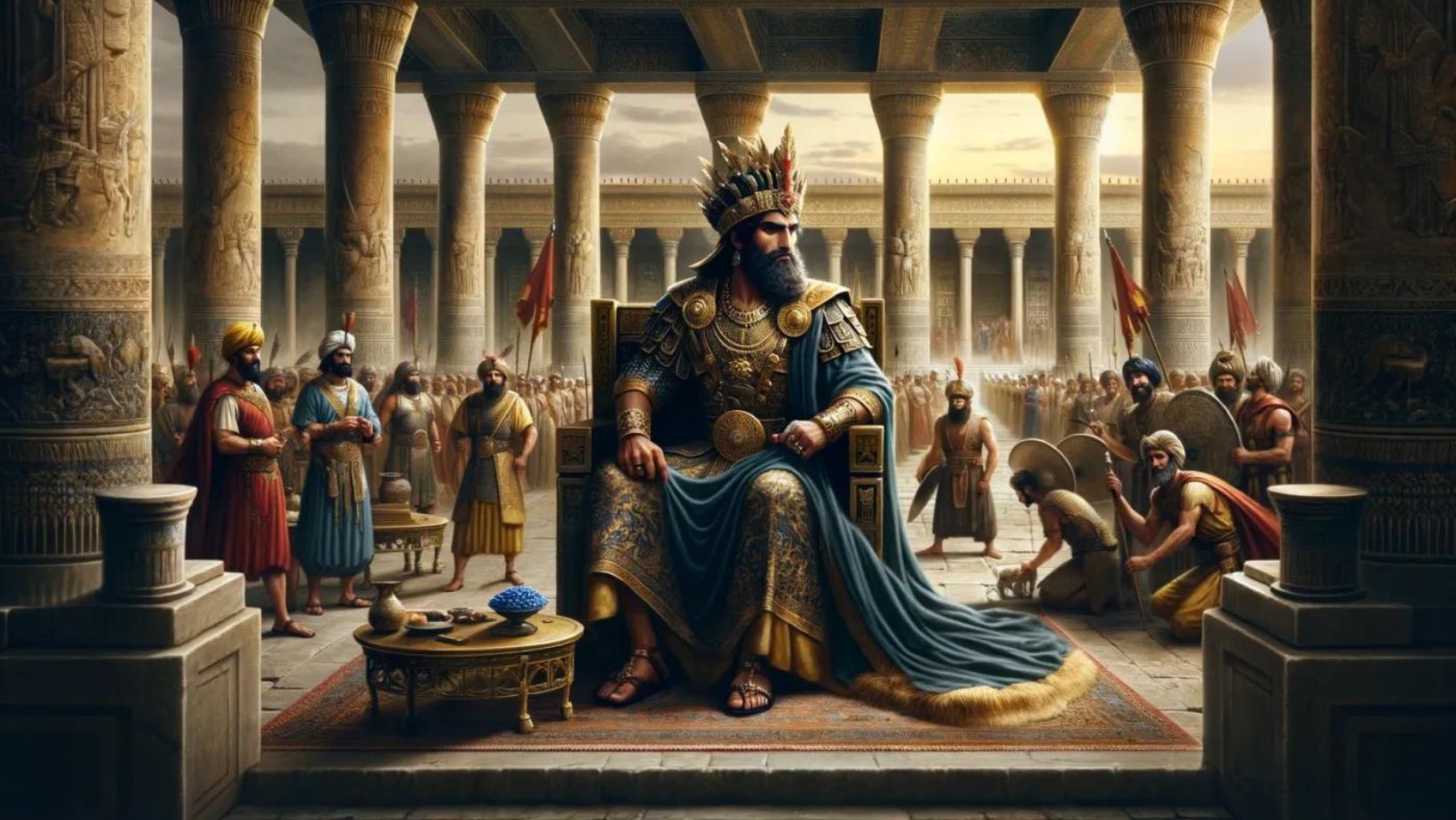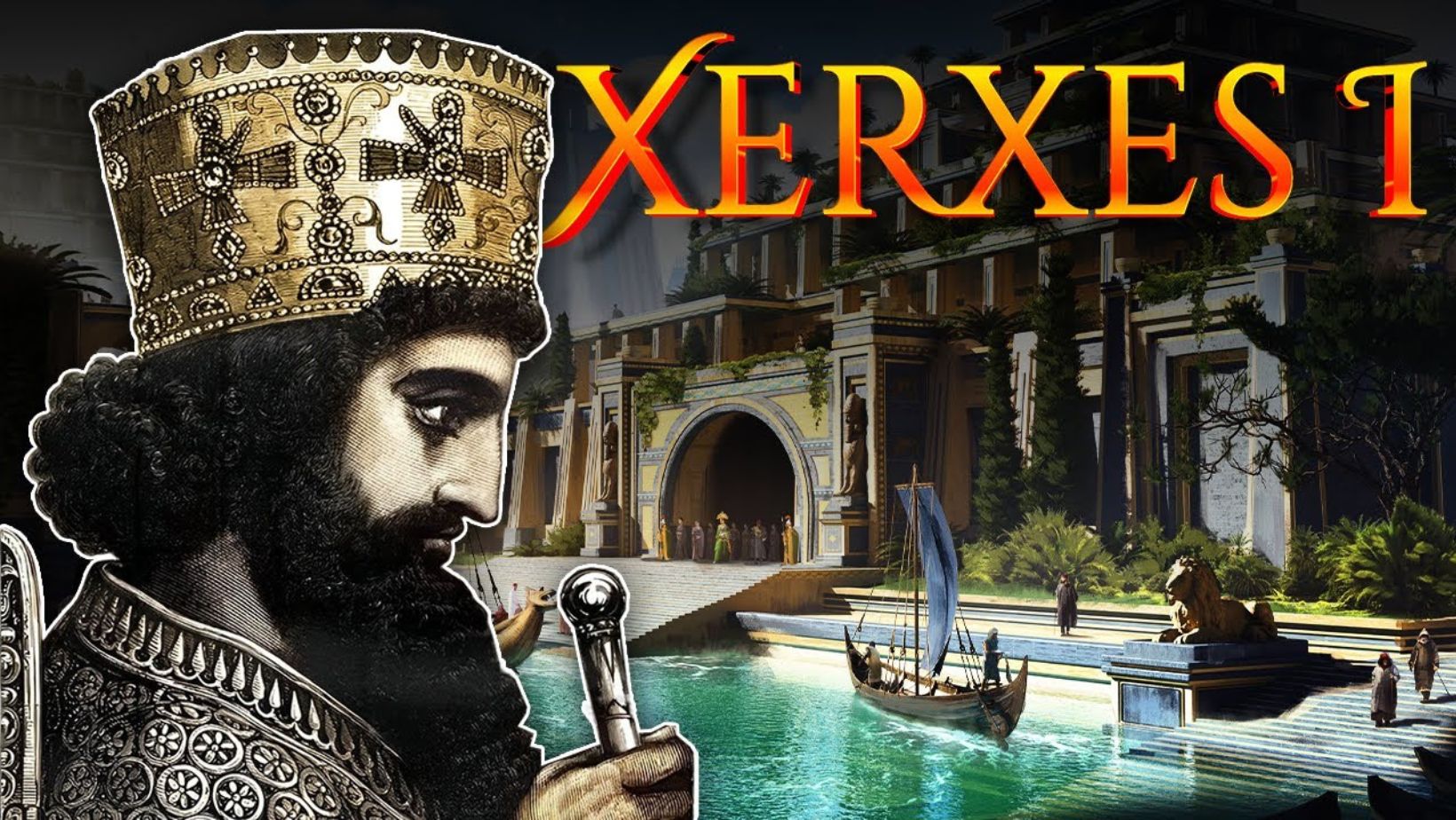When you think about legendary rulers who left an indelible mark on history, few figures are as polarizing or intriguing as King Xerxes. From his ambitious campaigns to conquer Greece to his monumental building projects that stretched the Persian Empire’s resources thin, The legacy of King Xerxes is a tale of ambition, power, and human nature at its most grandiose. So, this tale goes beyond just old battles or stunning buildings; it’s really about seeing how the dreams of one leader can leave a mark on the world that lasts long after they’re gone.
Table of Contents:
- The Rise of Xerxes I to the Persian Throne
- Xerxes’ Ambitious Campaign to Conquer Greece
- The Downfall of Xerxes and the Persian Empire
- Xerxes’ Extravagant Building Projects and Their Consequences
- The Lasting Legacy and Reputation of Xerxes the Great
- Conclusion
The Rise of Xerxes I to the Persian Throne: The Legacy of King Xerxes

Xerxes I, the notorious ruler of the Achaemenid Persian Empire, had a controversial path to the throne. He was the son of the great Darius I but not the eldest.
That honor went to his brother Artobazanes. But Xerxes’ mother, Atossa, daughter of Cyrus the Great, championed her son’s claim.
Controversial Accession, Dealing with Revolts in Babylon and Egypt
When Darius died in 486 BCE, the succession was far from smooth. Xerxes emerged victorious, but his rule was immediately tested.
Revolts erupted in Babylon and Egypt. The new Persian king had to act decisively to secure his throne.
He crushed the uprisings brutally, proving he was a force to be reckoned with. Xerxes was determined to expand Persian power even further than his illustrious predecessors, Cyrus and Darius.
Greece was in his sights, and Xerxes would stop at nothing to conquer it. The stage was set for an epic showdown between East and West.
Xerxes’ Ambitious Campaign to Conquer Greece: The Legacy of King Xerxes
Xerxes I, the Achaemenid Persian king, had a score to settle with Greece. His father Darius had tried and failed to conquer the defiant Greeks.
Now it was up to Xerxes to finish the job. He amassed an enormous army, the likes of which the world had never seen.
Finishing Darius’ Greek Campaigns, Crossing the Hellespont, The Battle of Thermopylae, Sacking Athens
In 480 BCE, Xerxes was ready to launch his invasion. He crossed the Hellespont with his troops, a staggering force numbering in the hundreds of thousands.
The Greeks, led by the brave Spartan king Leonidas, made their stand at the narrow pass of Thermopylae. For three days, they held off the Persian horde.
But Xerxes would not be denied. His forces outflanked the Greeks and annihilated them. The road to Athens lay open.
In August 480 BCE, the Persians sacked the city and burned it to the ground. It seemed that nothing could stop Xerxes’ ambition.
But the Greeks would not submit so easily. Their greatest test, and Xerxes’ ultimate undoing, was yet to come at sea.
The Downfall of Xerxes and the Persian Empire: The Legacy of King Xerxes
Xerxes I, the mighty Persian king, seemed poised to conquer Greece after his victory at Thermopylae and the sack of Athens. But the tide was about to turn.
The Greeks, determined to resist the Persian onslaught, hatched a daring plan to strike at Xerxes’ fleet.
The Battle of Salamis, Retreat from Greece, Harsh Punishments and Womanizing, Assassination by His Advisor
In September 480 BCE, the Battle of Salamis changed everything. The nimble Greek ships outmaneuvered the Persian behemoths in the narrow strait.
Xerxes watched helplessly from shore as his navy was decimated. Shaken, he retreated to Persia, leaving his general Mardonius in charge.
But the damage was done. The aura of Persian invincibility was shattered. Xerxes returned to his palace, drowning his sorrows in wine and women.
He ruled with a harsh and capricious hand, brutalizing subjects and families alike. In August 465 BCE, his reign of terror came to an abrupt end.
Xerxes was assassinated in his bedchamber by Artabanus, his most trusted advisor. The Achaemenid Persian Empire would never recover from its disastrous Greek campaign.
Xerxes’ Extravagant Building Projects and Their Consequences: The Legacy of King Xerxes
Xerxes I, the Achaemenid Persian king, is remembered not only for his failed invasion of Greece but also for his extravagant building projects. He sought to outshine his predecessors with grandiose displays of wealth and power.
But this opulence came at a steep price for his empire.
The Grand Palace at Persepolis, Susa Gate, and Apadana, Overextending the Empire’s Resources
Xerxes spared no expense in constructing his magnificent palace at Persepolis. The sprawling complex featured towering columns, intricate reliefs, and a grand audience hall known as the Apadana.
At Susa, another Persian capital, Xerxes erected the imposing Gate of All Nations. Its colossal statues and trilingual inscriptions proclaimed his dominion over a vast empire.
But these projects came at a heavy cost. The treasury was drained, and the empire’s resources were stretched thin.
Herodotus claims that Xerxes’ lavish spending nearly bankrupted Persia. The burden fell on his subjects’ backs, breeding resentment.
Xerxes’ reign marked the beginning of the Achaemenid Empire’s decline. His successors would struggle to control the unwieldy domain he left them.
The Lasting Legacy and Reputation of Xerxes the Great: The Legacy of King Xerxes

Xerxes I, known to history as Xerxes the Great left an indelible mark on the ancient world. His reign saw the Achaemenid Persian Empire reach its greatest extent yet also planted the seeds of its decline.
His legacy is one of great ambition and ultimate failure.
Depiction in Ancient Sources like Herodotus and Aeschylus, Influence on Later Persian Kings, Lasting Impact on Greek and Persian Relations
The ancient Greeks, Xerxes’ great nemeses, painted a vivid portrait of the Persian king in their histories and dramas. Herodotus cast him as a proud and capricious despot, while Aeschylus portrayed him as a tragic figure undone by his own hubris.
In Persia, Xerxes was remembered more fondly. Later kings sought to emulate his grandeur, if not his military misadventures. The opulent palaces he built at Persepolis and Susa became enduring symbols of Persian power.
But Xerxes’ most lasting impact was on the course of history itself. His invasion of Greece, though ultimately unsuccessful, set the stage for Alexander the Great’s conquest of Persia a century and a half later.
The clash between East and West, which Xerxes did so much to bring about, would shape the cultural and political landscape of the ancient world for centuries to come. For better or worse, Xerxes the Great’s legacy still endures.
Key Takeaway: The Legacy of King Xerxes
Xerxes I’s controversial rise to power, and ambitious campaigns shaped his legacy as a ruler of great ambition but ultimate failure. His extravagant projects drained Persia’s resources, while his military defeats began the empire’s decline. Yet, his grandeur influenced future Persian kings and set the stage for East-West relations.
Conclusion: The Legacy of King Xerxes
The journey through The legacy of King Xerxes reveals more than just historical events; it uncovers lessons in leadership, resilience, and the intricate dance between ambition and overreach. Whether it was through vast military campaigns that reshaped boundaries or colossal construction projects that pushed engineering limits, this Persian king taught us both what is possible when we dare greatly—and what pitfalls await those who reach too far without heed.
But here’s where our takeaway pivots from mere historical recounting into something timeless. In our daily grind or overarching life goals, let’s remember that every bold venture holds potential for greatness but demands respect for balance. Let’s walk away with not only knowledge about a ruler from millennia past but also insights applicable now—to careers needing innovation yet cautioning against hubris.
This isn’t merely revisiting dusty chapters in history books; it’s extracting wisdom relevant today from tales as old as time itself.

